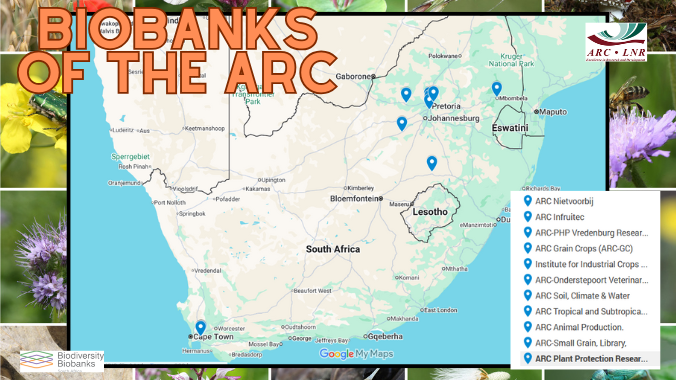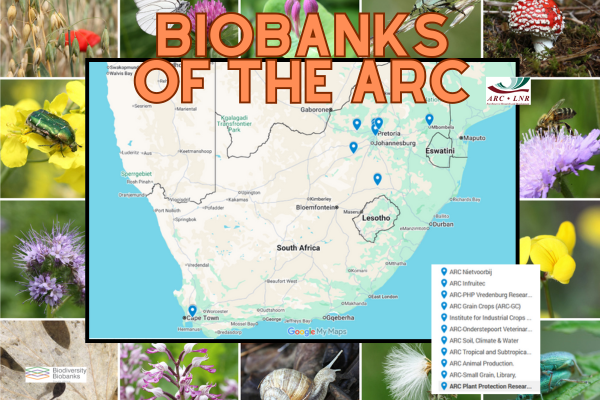Agricultural Research Council: Biobanks To Feed A Nation
The Agricultural Research Council (ARC) is a premier science institution that conducts research with partners, develops human capital and fosters innovation to support and develop the agricultural sector. That’s a lot of work, involving a lot of different fields – so it’s no surprise that the ARC is one of the Biodiversity Biobanks South Africa’s largest and most diverse members.
Biobanks under the custodianship of the ARC include plant, animal and microbial based assets. They Include living collections and biodiversity biobanks, as well as databases, natural science collections and accredited research facilities. With biobanks over 11 campuses in all nine provinces, the ARC provides critical infrastructure that underpins agricultural innovation and food security in South Africa.

With biobanks over 11 campuses in all nine provinces, the Agricultural Research Council provides critical infrastructure that underpins agricultural innovation and food security in South Africa.
These biobanks include…
ARC-Grain Crops (Potchefstroom): The Grain Crops Division was established in 1981 in Potchefstroom in the North-West Province. Strategic and need driven research involves cultivar evaluation, plant breeding, improvement of crop quality, weed control, tillage, plant nutrition, water utilisation, plant pathology, entomology and nematology.
ARC Infruitec-Nietvoorbij (Stellenbosch): This biobank houses microorganisms and conducts research central to the wine industry, in conjunction with local universities. This NPGA further supports the monitoring of species diversity associated with the vineyards, contains yeast isolates, provides diagnostic tests and provides test commercial yeast strains to the local and national wine industry.
ARC-Institute for Industrial Crops (Rustenberg): This biobank is responsible for research on industrial crops. Its work focuses on the cultivation, processing, and value-addition of crops used for non-food purposes, including fibre, medicinal, and energy crops. Key areas of research include developing sustainable propagation technologies for medicinal plants and exploring new value-added products from industrial crops.
ARC-Institute for Soil, Climate and Water (Pretoria, Arcadia): The oldest of the ARC campuses, this research institute provides scientific solutions for sustainable land use, climate resilience and food security in the context of a changing climate. ARC-ISCW’s key activities include national resource monitoring, climate change adaptation and mitigation, technology transfer, spatial data management and food security research.
ARC-Institute for Tropical and Subtropical Crops (Mbombela/Nelspruit): The Tropical and Subtropical Crops Division provides sustainable and appropriate technologies for production and post-harvest handling of citrus and subtropical crops in order to enhance food security and nutrition, global competitiveness and wealth creation by addressing national priorities through its holdings.
ARC National Forage Genebank (Irene, Pretoria): The role of the ARC-NFG is to ensure the conservation and continued availability of genetic resources for planted pasture improvement. This includes the conservation of forage biodiversity, the provision of well-documented and monitored germplasm for researchers, the public and other national organisations as well as the provision of fundamental resources for biodiversity research.
ARC-Onderstepoort Veterinary Institute Campus and Biotechnology Platform (Onderstepoort, Pretoria): The role of the ARC-BTP is to create the high-throughput resources and technologies required for applications in genomics, quantitative genetics, marker assisted breeding and bioinformatics within the agricultural sector. The technologies established within the platform are accessible as services to the ARC, collaborators, companies, science councils and researchers across the continent.
ARC-Plant Health and Protection, Mycology Unit (Roodeplaat, Pretoria): The ARC-PHP is host to the National Collection of Fungi, which houses approximately 33 000 specimens of fungi from 159 genera from all over the world (and safeguards an additional 9000 strains from the SAMRC), and is heavily involved in combatting invasive strains of fungi and protecting South Africa’s plants. Meet the NCF here.
ARC-Small Grain Institute (Bethlehem, Free State): The National Small Grain Collection is housed in a state-of-the art, dedicated storage facility at the Agricultural Research Council (ARC) Bethlehem Campus. It is the largest collection of small grain germplasm on the African continent, and plays a vital role in the conservation and study of small grain genetic resources for improved future use. Meet the ARC Small Grain Collection Biobank here.
ARC-Vegetable Industrial and Medicinal Plants (North of Pretoria): The ARC VIMP in vitro Genebank performs innovative, need-driven, environment friendly research, technology development and technology transfer on potatoes, vegetables (hydroponic production as well as indigenous vegetables) and indigenous flowers. Research is aimed at both the commercial and developing agricultural sector.
Want to know more about the many faces of the ARC biobanks? Just watch this. Interested in the other biobanks of the BBSA? We’ve got you covered. And while you’re at it, why not learn more about what biobanks are (and aren’t) all about?

What are biodiversity biobanks?
Biodiversity biobanks are repositories of biologically relevant resources, including reproductive tissues such as seeds, eggs and sperm, other tissues including blood, DNA extracts, microbial cultures (active and dormant), and environmental samples containing biological communities….






